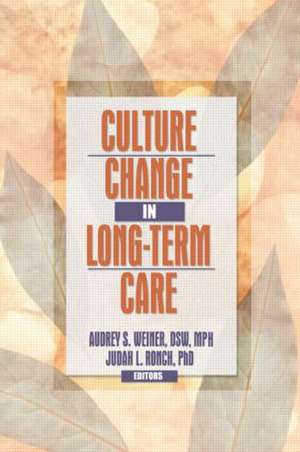Culture Change in Long-Term Care
Autor Audrey S. Weiner, Judah L. Ronchen Limba Engleză Paperback – 9 dec 2003
This book will inform you about the theoretical and practical applications of culture change within the institutional long-term care setting. It examines existing models of “positive cultures,” emphasizing philosophy, underpinning, and implementation. You'll gain a greater understanding of theoretical frameworks for organizational change, of the changes that can occur in all members of the long-term care community, and of culture change in the context of broad organizational experience and cultural competence.
From the editors: “This text provides a timely and comprehensive approach to understanding culture change from the perspective of management and business as well as policy and regulatory guidelines and the framework for aging services. It will provide the reader with an understanding of the current state of the art in conceptualizing long-term care environments that are resident-centered and resident-directed, that respect the individuality of the staff, and that are high-performance entities. The theory and practice of culture change are presented with an eye toward a future where aging people and their families will be both consumers and providers of long-term care.”
- The first section of Culture Change in Long-Term Care explores the cultural values existing in today's long-term care environment that make us desirous of culture change.
- The second section examines existing models and networks of culture change in long-term care, including the Eden Alternative, Wellspring, and Pioneer Network
- Section three brings you to the frontline with case studies from urban, suburban, and rural facilities, facilities with and without unionized staff, facilities from various geographic regions of the United States, and facilities whose experience ranges from years to a decade. Processes, challenges, and qualitative/quantitative findings are included.
- Section four provides international perspectives, with practical advice from Australia, Sweden, and British Columbia.
- The final section of Culture Change in Long-Term Care explores the underlying question: “Is change realistic?” This section explores the role of state government, public policy, and the regulatory environment in accomplishing culture change.
Preț: 340.39 lei
Preț vechi: 429.67 lei
-21% Nou
Puncte Express: 511
Preț estimativ în valută:
65.14€ • 67.30$ • 54.21£
65.14€ • 67.30$ • 54.21£
Carte tipărită la comandă
Livrare economică 26 martie-09 aprilie
Preluare comenzi: 021 569.72.76
Specificații
ISBN-13: 9780789021113
ISBN-10: 0789021110
Pagini: 466
Dimensiuni: 156 x 216 x 29 mm
Greutate: 0.86 kg
Ediția:1
Editura: Taylor & Francis
Colecția Routledge
Locul publicării:Oxford, United Kingdom
ISBN-10: 0789021110
Pagini: 466
Dimensiuni: 156 x 216 x 29 mm
Greutate: 0.86 kg
Ediția:1
Editura: Taylor & Francis
Colecția Routledge
Locul publicării:Oxford, United Kingdom
Notă biografică
Audrey S. Weiner, Judah L. Ronch
Cuprins
Foreword SECTION 1. INTRODUCTION TO CULTURE AND VALUES IN LONG-TERM CARE Unloving Care Revisited: The Persistence of Culture Managing Organizational Culture Change: The Case of Long-Term Care Culture Change in Long-Term Care Facilities: Changing the Facility or Changing the System? The Historical Context of “Humanistic” Culture Change in Long-Term Care Leading Culture Change in Long-Term Care: A Map for the Road Ahead Achieving Organizational Change Within the Context of Cultural Competence The Changing Consumer: The Social Context of Culture Change in Long-Term Care Family Caregivers, Health Care Professionals, and Policy Makers: The Diverse Culture of Long-Term Care Pioneer Network: Changing the Culture of Aging in America SECTION 2. MODELS OF CULTURE CHANGE IN LONG-TERM CARE Evolution of Eden Culture Change in Long Term Care: The Wellspring Model Models for Individuals with Alzheimer Disease: Beyond the Special Care Framework Peer Mentoring of Nursing Home CNAs: A Way to Create a Culture of Caring The Live Oak Regenerative Community: Championing a Culture of Hope and Meaning SECTION 3. CASE STUDIES: IMPLEMENTING CHANGE Teresian House Using the Environment to Support Cultural Change Center for Nursing and Rehabilitation Culture Change in an Urban Environment The Providence Mount St. Vincent Experience Organizational Culture and Bathing Practice: Ending the Battle in One Facility The Power of Circles: Using a Familiar Technique to Promote Culture Change SECTION 4. CASE STUDIES: CULTURE CHANGE BRIEFS Introduction to Case Studies: Culture Change Briefs Apple Health Care: Culture Change in a Privately Owned Nursing Home Chain Case Study Brief: The Lyngblomsten Care Center, St. Paul, MN SECTION 5. AN INTERNATIONAL PERSPECTIVE Using Strengths-Based Practice to Support Culture Change: An Australian Experience Implementing the Eden Alternative® in Australia Beyond the Medical Model The Eden Alternative® in Practice: A Swiss Experience Changes in Long-Term Care for Elderly People with Dementia: A Report from the Front Lines in British Columbia, Canada SECTION 6. IS CHANGE REALISTIC? Quality Oversight and Culture Change in Long-Term Care Policy Values and Culture Change in Long-Term Care The Role of State Government in Catalyzing Change Selecting a Model or Choosing Your Own Culture Successfully Surviving Culture Change Index Reference Notes Included
Descriere
This book, selected for inclusion in Doody's Core Titles in the Health Sciences, 2005 edition (DCT), will inform you about the theoretical and practical applications of culture change within the institutional long-term care setting. It examines existing models of “positive cultures,” emphasizing philosophy, underpinning, and implementation. You'll gain a greater understanding of theoretical frameworks for organizational change, of the changes that can occur in all members of the long-term care community, and of culture change in the context of broad organizational experience and cultural competence.













